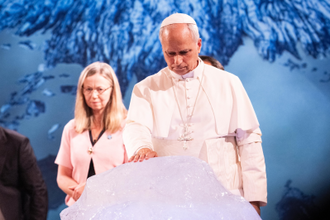We can't live on the internet - a reflection for World Food Day

Ellen Teague
The following talk was given by Ellen Teague during the evensong service for World Food Day - 16 October - in the Chapel of Hertford College, Oxford University at the invitation of the chaplain, Revd Gareth Hughes.
Do you recognise this quote?
"We lived on farms, then we lived in cities, now we are going to live on the internet".
It's from the film 'The Social Network', voiced by a guru of new media - Sean Parker. He says, excitedly:
"We lived on farms, then we lived in cities, now we are going to live on the internet".
This struck me forcibly when I first heard it. In some ways its true of the last three generations of my family - my grandparents spent all their lives on farms, my parents moved to the city - London, and now I do tend to live on the internet. But in another sense the view expressed isn't true. Many of us spend a lot of time on the internet but we can't live on the internet. Despite all our modern trappings, what we need to live on is still as basic as it ever was - food and water.
The Somali mother in Kenya's Dadaab refugee camp knows this…. along with 12 million others currently facing famine in the Horn of Africa.
The Haitian child in Port au Prince knows this as he tucks into his meal of a mud cake - the staple food of the poor and made from dried dirt mixed with salt, shortening and sugar.
The self-catering student at university who can allocate only £12 a week to food expenditure knows this.
But many of us risk forgetting it. Food is often taken for granted and unappreciated.
Today is World Food Day - a day celebrated every year on 16 October in honour of the date of the founding of the UN World Food Programme. This year the international focus is on the volatility of food prices - a crucial issue for people on low income. But all of us - except the very rich - in fact need food price stability for our well-being. How many of us hear complaints about rising food prices in our homes?
Why is food pricing an issue? Between 2005 and 2008, the world's staple food prices soared to their highest levels in 30 years. In 2008 the maize price increased by 74 percent while that of rice almost tripled. Food riots broke out in more than 20 countries. Over the past year rising food costs pushed nearly 70 million more people into extreme poverty. Tonight, one in five of the world's population will go to sleep hungry and the price of food is a key reason for this. I remember in 1986 sitting in Juba in Southern Sudan and reflecting that around the city were camps holding two million people all in need of food aid, yet I ate three times a day. What was the difference? I could afford to buy food.
Price swings, particularly upwards, represent a major threat to food security in developing countries. Hardest hit are the poorest. For poor countries, food imports become more expensive. For individuals, people living on less than US$1 a day may need to skip a meal when food prices rise. Farmers everywhere face more anxiety about the price their crops will fetch at harvest time, months away.
But why has the food market become so turbulent? Let me highlight six key reasons.
Under-funding of agriculture by rich and poor countries alike is probably the main single cause of the problems we face today, according to the UN. Christian Aid released a report this week called 'Healthy Harvests' complaining about the under-funding of Africa's small farmers. Instead of nurturing small scale traditional agriculture, the resources from the west - major backers like the World Bank, Britain's Department for International Development, and the Bill and Melinda Gates Foundation - largely go into industrial agriculture which requires the heavy use of fertilisers and pesticides. There has been a huge push of genetically modified seeds, for example, which require specific chemical inputs. Why not focus on renewable and locally available resources of seeds and manure? Why not listen to African women who do most of the farming in Africa. Of course the big biotech corporations such as Monsanto have played a major role in pushing agriculture in an industrial direction and I recommend you to view the film 'The world according to Monsanto' which you can download on the internet.
Then there's the issue of Biofuels - growing crops for fuel instead of food. The cost of the biofuel boom in Indonesia has been the destruction of its tropical forests. Oil palm plantations have caused staggering environmental damage and tremendous loss of biodiversity which is vital for food security.
Reason three is to do with some pretty disastrous decisions human society has made about development and security that have meant a loss of habitat and poisoning of the environment. Did you know that every third bite of food we consume depends on pollination by bees, but all around the world hundreds of millions of bees have disappeared. Do we realise how much this matters? And think of the impacts of war and conflict on food production.
Diet is an another key issue - People eating more meat and dairy produce means the rising need for feed grains produced for cattle.
And what about the recent entry of institutional investors with very large sums of money into food commodity futures markets with scant regulation. Banks, hedge funds and pension funds are betting on food prices in financial markets, causing drastic price swings in staple foods such as wheat, maize and soy. The World Development Movement, which is running a campaign on food speculation, points out that Barclays - which has little connection with food - makes up to £340 million a year from betting, or speculating, on food prices.
And the massive issue of Climate Change needs to be addressed in a much more serious way. Take the Horn of Africa famine. Tearfund has been up front in saying that climate change is a factor in the chronic drought, falling crop yields and loss of livestock affecting the region. Along with CAFOD and Christian Aid it held a vigil outside the Conservative Party Conference two weeks ago to urge that the British government keep its pledge on ambitious carbon emissions targets made in June. One thousand people were there in Manchester. This is in the context of the lead-up to the next UN climate talks in South Africa in late November.
If we are to address these issues we must stop taking food for granted. We could start with reflecting on food security issues. Follow agencies such as the World Food Programme, the big development agencies, the World Development Movement, the student group People and Planet on Twitter and you'll soon find out more about food concerns. And help those who are hungry through lobbying and financial support. Today it was announced that the Disasters Emergency Appeal for the Horn of Africa has reached £72 million… excellent.
Appreciate the food you eat every day. And consider what guidelines govern it? Christian Ecology Link suggests that food we consume should follow the LOAF principles as far as possible, LOAF is an acronym for food that Locally produced, Organically Grown, Animal friendly and Fairly Traded. Most of us are sharing a meal together after this service. Bring to mind all the important occasions in your life that have involved the sharing of food. Two weeks ago my family had a special meal before seeing my three sons off to University. I'm sure that happened in your homes too.
But here we are at a religious service on World Food Day. What connections are there between food and faith? Despite the focus of many Christian services on a Eucharistic meal and celebrating the gifts of creation, too often Christians - along with everyone else - have alienated themselves from the natural world which provides the very air, forests, water, soil - the matrix of agriculture - which we depend upon for life. We need a theology that embraces the ecological paradigm. Just as we embrace solidarity with the poorest of humanity, we need to stretch to solidarity with the natural world as well. The prevalence and persistence of hunger in our world is a sign of the scale of the social and environmental challenges we face. We must begin to understand that we all eat at the same table and that all the tables we gather around in our daily lives are connected.
Among many of the world's great faith traditions, the eating of food is accompanied by some form of a grace-saying act. In offering thanks or a blessing, we show that we do not take food and our lives for granted. What previous generations of farming families would have understood as a concrete world - the ecological webs of relationship - can be hidden when food is reduced to a sign-a marketing label or brand - without depth or reference to its story. Yes, food items have stories too and far too often they involve journeys of more than a thousand miles to reach our plates and often through various forms of processing. Too often food has been reduced to a commodity that will, we presume, always be available at the store, or the college refectory, provided we can muster the credit card swipe. Saying grace can become a means to the recovery of a world where real food - slow food - is appreciated and celebrated.
Affordable food pricing is a local as well as a global issue. Just this week, Oxfam pointed out that food prices in Britain are rising at a rate more than twice as fast as the National Minimum Wage. One in six parents say they had even gone without a meal themselves so they can put food on the table for their family. Down the road from here - in Abingdon - the Baptists are running a food collection and distribution service for local people who cannot afford food. You will see on the news today that globalization protests at financial centres have reached London - to the steps of St. Paul's Cathedral, in fact - and anxiety about food security for the poorest is part of this.
But at the same time, many here and in the global south are acting on the need for greater human humility, responsibility, and celebration. There is an international food security summit in Rome next week, and peasant movements such as La Via Campesina from Latin America are lobbying for greater control over agriculture and food pricing. And young people are doing their bit here. An increasing number of schools are eco-schools or part of the Soil Association's Food for Life Programme where food is grown on school green spaces. My oldest son is studying Fine Art at Loughborough University and he has phoned this week to check that I have harvested the last of our crop of tomatoes. He looked after our family vegetable plot in the garden all summer. I'm so proud of my son's interest, part of a growing movement towards sustainable food and agriculture, where everybody has access to nourishment. Through growing food we can see, smell, touch, and taste first-hand the miraculous and fragile processes of birth, growth, death, decay, and rebirth that are all part of God's wonderful creation going on all around us and providing us with our food.
These processes are all celebrated in the beautiful liturgy that has been prepared today and I thank those responsible for marking World Food Day here. I'll conclude with the refrain from one of our hymns - a Harvest Hymn - which reminds us of the need for human humility and thanksgiving to God for the harvest:
All good gifts around us
Are sent from heaven above,
Then thank the Lord,
O thank the Lord
For all His love.
Ellen Teague is a member of the London-based Columban JPIC Team.


















